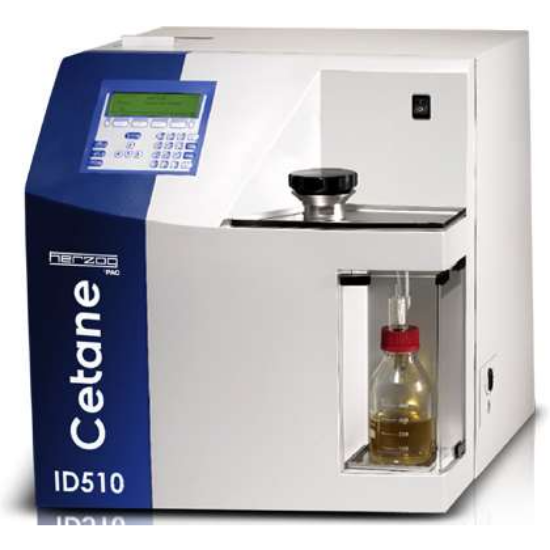Test Methods: ASTM D7668
Description
Accurate analysis of Derived Cetane Number (DCN) is an important tool for diesel and biodiesel fuel blenders and refineries to maintain fuel consistency and quality. Existing technologies, such as CFR Engine and CVCC methods, do not meet present market requirements with their high investment and operational cost, difficult operation, and poor system performance. Herzog by PAC pioneered the Cetane ID 510 instrument, a unique technology that is proven to provide the best precision in the market for determining DCN of all types of Diesel Fuels, Biodiesel, FAME, HVO, BTL, and GTL. It is a compact, easy to use, and fully automated analyzer, that offers excellent return on investment, and that is in compliance with today’s safety requirements. The CID 510 is in perfect correlation to ASTM D613. The test method ASTM D7668 is approved as standard and officially listed in diesel specifications: ASTM D975, ASTM D6751 and ASTM D7467
The CID 510 is proven to offer the best performance in the market. The excellent precision and correlation of this technology allows refineries to run their process closer to the specification limit for the cetane number.
When comparing the CID 510 to the CFR Engine costs can be reduced by 80%. You can save on calibration, labor and consumables for sample testing, plus the savings on the initial investment, which ultimately increases a refinery’s profitability. For a refinery producing 100,000 barrels per day diesel, being 1 cetane number closer to the specification would save a refinery around $800,000 USD.
Applications
Combustion Cetane
Features & Benefits
Best Precision and In Perfect Correlation to ASTM D613, EN 16715 and IP615
- Test method ASTM D7668 is officially approved in diesel specifications: ASTM D975, ASTM D6751 & ASTM D7467
- ASTM D7668 can officially be used as an alternative test method to the CFR Engine acc. to ASTM D613 to certify diesel fuel.
- Proven performance from joint ASTM /EI Inter Laboratory Study
- Precision (r & R) exceeds CFR Engine and other CVCC instruments
- Cross Method Reproducibility (Rxy) is much better than other CVCC alternatives
- Excellent correlation of the Cetane ID 510 to the mean value of the CFR Engine
- No Carry-Over Effect for sample measurements containing Cetane Improver
Significant Savings on investment and maintenance
- Requires much less valuable space than CFR Engine (no separate room necessary)
- Automated calibration for long-term stability minimizes down-time risks
- Lower investment cost than alternative technologies
- No special user training required
High Standards for Safe Operation
- Built-in fire monitoring and suppression system
- Fuel level sensor to avoid the injection system from running dry
- Over pressure protection for fuel injection system and combustion chamber
- Automated diagnostic functions Leak test for combustion chamber
- European Patent
Robust and Fully Automated Technology for High Ease of Use
- Fully automated, easy to use, one button operation allows minimal operator training
- Electronically controlled High Pressure Fuel Injection Design contributes to high accuracy
- No cleaning of the test chamber required: soot less combustion eliminates cleaning of Fuel Injection System, Combustion Chamber and
- Automatic Calibration with Primary Reference Fuels

